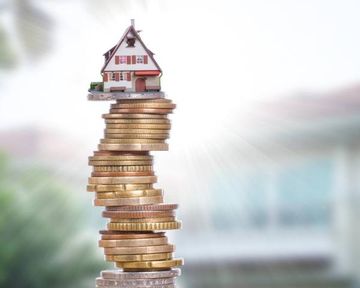Settling in: Your guide to adjusting to your new home
After grappling with endless open houses, wrestling with a mountain of legal jargon, and drowning in a sea of paperwork, you've finally emerged victorious. Your dream of owning a home is no longer just a dream—it's your reality. Now you are faced with all kinds of new responsibilities and financial commitments - it is therefore crucial that you kick off on the right foot. off on the right note, a thoughtful 'start' button if you will. Buckle up, friend, because it's time to get this show on the road.
The luxury of simply dialing the landlord when something goes wrong? You can kiss that goodbye. You ARE the landlord now. And, let's not even get started on the additional monthly expenses like building insurance and municipal rates. It's enough to make your head spin, right? But don't fret, this is all a part of the home-ownership package, and you've got this!
The following new homeowner tips to make your transition to property owner a little smoother:
Create a Homeowner’s File
Before you move into your new home, create a binder or allocate a drawer in your filing cabinet for important documents relating to your home, including your mortgage and home insurance paperwork.
Once you’ve moved in add all your appliance user manuals and warranties and keep all receipts relating to home improvements as you will need these for tax purposes when the time comes to sell.
After your move in, use the same binder to store all of the guides and warranties for your new appliances. Store receipts for any home improvement and moving expenses here as well. You’ll want to hang on to these for your taxes. You can also start collecting contact information for reliable contractors in this binder.
More here on the legacy file you should have for your home
Start an Emergency House Fund
You never know when something is going to go wrong, or how much it is going to cost and, as repairs are now your responsibility, this can real put a strain on your finances if you aren’t prepared.
And, the longer you live in your home, the more likely you are to experience surprise issues like plumbing faults and electrical failures or even big-ticket repairs like new roofing, plumbing, heating or roofing issue so start an emergency savings account as soon as possible and try to contribute to it religiously.
Make Friends with Your Neighbours
This is a good idea for a number of reasons. Building a relationship with your neighbours will help to resolve disputes more easily should they ever arise, enable you to get good recommendations for any services you may need and it’s also better for security as neighbours who know each other, look out for each other.
Put Together a Basic Toolbox
The last thing you want to become is that new neighbour who always borrowing something and you don’t want to have to call out a contractor every time anything small goes wrong.
Purchasing your first home has likely left you stretched thin money-wise, so you don’t need to go overboard but it’s a good idea to buy the essential tools you're most likely to need.
These include a hammer, flat-head screwdrivers, Phillips-head screwdrivers, a hammer, a wrench, a torch, and a power drill.
Here are 7 home maintenance tips that will save you money in the long run
If Possible, Get Small Projects Finished Before You Move In
It is a good idea to complete certain small projects such as painting rooms or removing old wall-to-wall carpeting before moving into your new home. Your home is then liveable and you have time to plan bigger projects properly.
Wait To Start Any Large Projects
Home improvement projects are expensive and, to avoid completing unnecessary projects, it’s always best to live in your new home for several months before making any final decisions.
This will allow you to get a feel for your home, how the existing layout works and what really needs to be changed. It will also give you time to save for any upcoming projects.
Focus On Upgrades That Will Give You the Most Bang for Your Buck
Unless you have a generous budget, it’s best to focus on improvements that will give you the most return on your investment. Take the time to do a little research - find out what the most popular features are in your area and how much the work will cost.
As a general rule of thumb, projects that typically yield a good return include kitchen and bathroom upgrades, repainting in neutral tones, and an attractive outdoor living area or deck,
Complete One Project at a Time
It may be tempting to finish all your improvements as soon as possible, but don’t work on multiple home projects at once. Not only will you exhaust your finances, but you will also make your new home unliveable and add unnecessary stress to your everyday life.
Pay Attention to Your Energy Usage
This is especially important if you’ve bought a bigger home than you lived in before. Pay attention to how your home is using energy and learn how to reduce your carbon footprint and save money. You’ll be surprised how small changes can affect your electric bill and ease your monthly expenses.
Homeowner tips and tricks for reducing your energy costs:
- Lower your geyser thermostat to 50 degrees celsius in summer and between 60-65 degrees celsius in winter.
- Switch out lightbulbs for energy-efficient LED lightbulbs.
- Move your refrigerator away from your oven.

